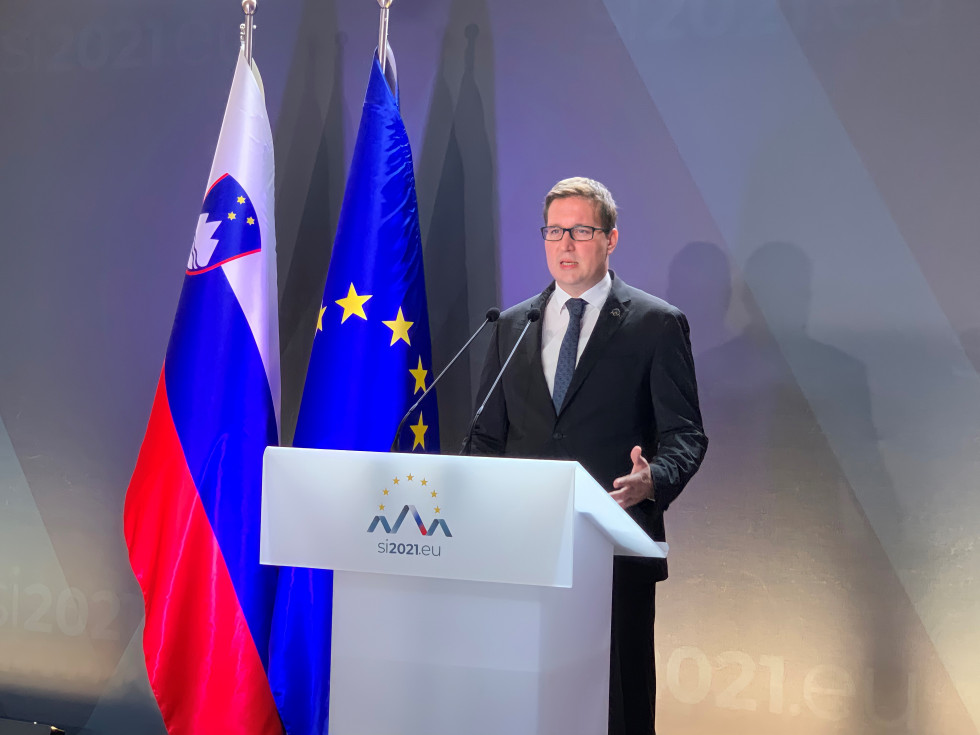EU as a community of people: national borders within the Union are lines of the aggregators rather than dividing lines between nations

Minister of Public Administration Boštjan Koritnik initially addressed the participants | Author Ministry of Public Administration
At the conference dedicated to local self-government, national and international experts participated in two panels. The first one looked at examples of good practices in the creation of smart cities and villages that offer innovative solutions to its citizens with new technologies. The second panel shared experiences on cross-border cooperation and the participation of municipalities in European groupings of territorial cooperation.
“Local authorities are often overlooked; however, they are indispensable for providing quality services to their citizens. This is why, under the Slovenian Presidency, we set our goal of paying tribute to their efforts through a dedicated thematic conference”, said Minister Koritnik, adding that smart cities and villages build on the physical reality of ICT.
The participants agreed that the use of advanced digital technologies is designed to address developmental, economic, societal, and political challenges. However, this is possible only if communities are in favour of digital solutions and are able to use them and recognise their value. As a result, cities and communities are becoming the starting point for the digital transformation of society. The key to success is that all stakeholders, including citizens, are involved in designing smart city solutions from the onset.
To this end, the Ministry of Public Administration launched a call for tender for smart city and community demonstration projects this year. It aims to speed up the deployment of innovative solutions in the field of digitalisation of municipalities that will enable better management, communication, proactive problem-solving, coordination of rapid response resources and processes. By doing so the consequences of unforeseen events and natural disasters will have been minimising and a better quality of life for citizens and visitors will have been ensured. The call received 14 applications for a total amount of 14 million euros. 159 municipalities are involved in the projects, representing 75 % of all Slovenian municipalities.
Minister Koritnik also stressed the importance of cross-border integration: “Cross-border cooperation in the context of European territorial cooperation is part of a common European cohesion policy which supports the balanced development of the European Union as a whole. The national borders within the Union are the lines of the aggregators, not the dividing lines between nations.”
As part of the event, the Minister also signed, on behalf of the Republic of Slovenia, the Declaration on joining forces in promoting sustainable digital transformation of cities and communities in the EU, which aims at an inclusive and digital Europe that enables every community to benefit economically and socially from this transformation, while ensuring that no one is left behind.
The Panel on Smart Cities and Villages was moderated by Dr Peter Merc, with the participation of:
- Gregor Macedoni, Mayor of the City of Novo Mesto
- Ana Pleško, co-founder of Simbioza
- Toomas Turk, Head of Digital Innovation Department in Tallin City Administration
- Kieran O' Hea, Irish expert in Smart City Development
The Cross-Border Cooperation Panel was moderated by the Mayor of Slovenska Bistrica and the former Minister for Local Self-Government and Regional Policy Dr Ivan Žagar. It was attended by:
- Petr Blížkovský, Secretary-General of the European Committee of the Regions
- Dr Klemen Miklavič, Mayor of the City of Nova Gorica
- Gerald Hartmann, Director of the EGTC Geopark Karavanke
- Edwin Lefebre, Home Affairs Agency of the Flanders Government

